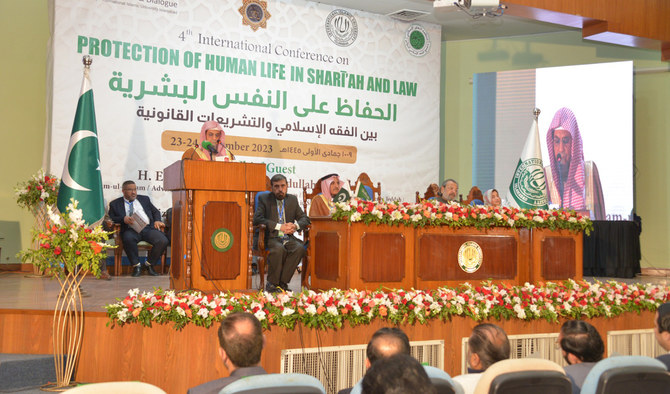ISLAMABAD: Imam-e-Kaaba Sheikh Saleh bin Humaid said on Thursday the ongoing massacre of innocent people in Gaza marked “one of the darkest periods in human history,” demanding global powers halt crimes against humanity in Palestine.
He expressed these views while addressing the fourth international conference on the protection of human life in Shariah and law, jointly organized by International Islamic University Islamabad and International Islamic Fiqh Academy Jeddah.
Sheikh Saleh, an adviser to the Kingdom’s Royal Court, is in Islamabad on a four-day visit to enhance brotherly ties between Pakistan and Saudi Arabia.
“The ongoing massacre of innocent people in Gaza marks one of the darkest periods in human history,” Sheikh Saleh said. “Global powers must uphold the sanctity of human lives and halt crimes against humanity in Gaza.”
He said taking a human life was prohibited by all religions, yet Muslims continued to face mass atrocities under the guise of ‘human rights’ in Gaza.

Pakistan's caretaker education minister Madad Ali Sindhi (3rd right) presents a souvenir to Imam-e-Kaaba Sheikh Saleh bin Humaid (3rd left) in Islamabad, Pakistan on November 23, 2023. (Photo courtesy: Islamic International University)
The Imam-e-Kaaba prayed to Allah to deliver severe punishment to the oppressors and relieve the Palestinians of the hardships they faced.
He said Islam places special emphasis on the sanctity of human life, and both religion and human life hold distinct importance in the Islamic law, without discrimination based on belief.
“Allah has sworn to protect human life, and those who unjustly take a life face the promise of hell,” he added.
During his visit, Sheikh Saleh will lead Friday prayers at the iconic Faisal Mosque in Islamabad, and meet with the Pakistani president, prime minister and other officials.
Speaking at the conference, he praised the Pakistani hospitality and extended greetings on behalf of the Custodians of the Two Holy Mosques and scholars of Saudi Arabia.
He said the ongoing collaboration between the Islamic Fiqh Academy and International Islamic University was crucial, and educational and research institutions in Muslim countries should prioritize mutual cooperation.
















